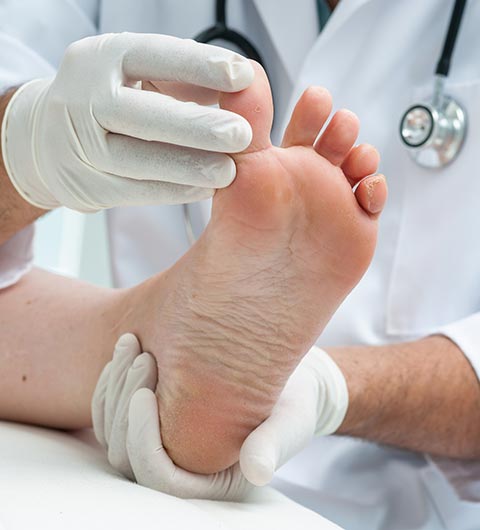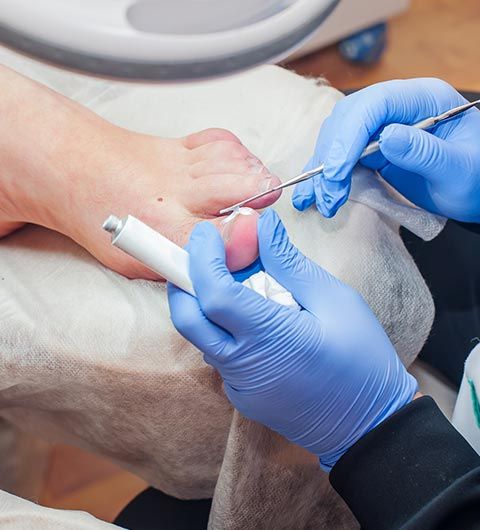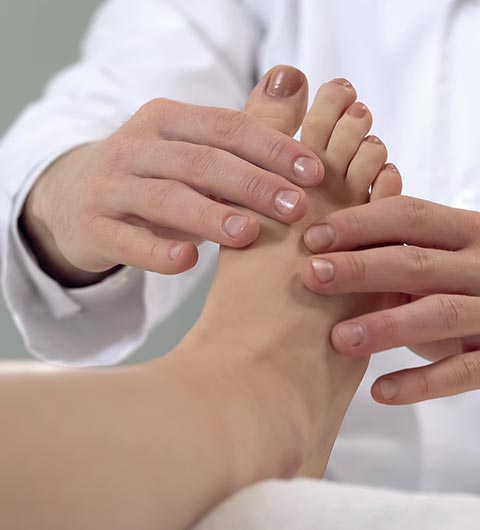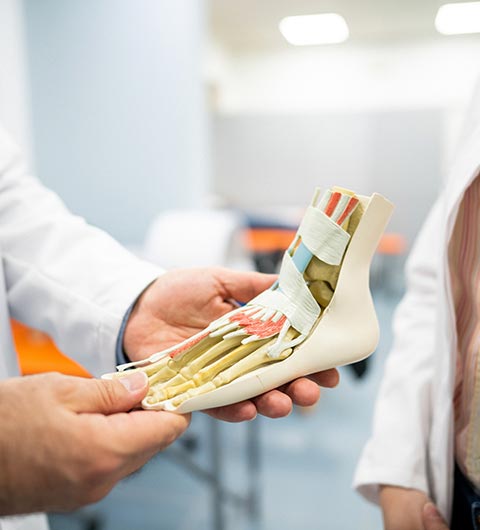Common Foot Problems
Following are some of the foot-related symptoms that indicate you need to contact a Podiatrist:
- You have persistent pain in your feet or ankles.
- You have noticeable change to your nails or skin.
- Your feet are severely cracking, scaling, or peeling.
- There are blisters on your feet.
- There are signs of bacterial infection, including:
- Increased pain, swelling, redness, tenderness, or heat.
- Red streaks extending from the affected area.
- Discharge of pus.
- Symptoms that do not improve after two weeks of treatment with a non-prescription product.
- Spreading of the infection to other areas, such as the nail bed, or skin under the nail, the nail itself, or the surrounding skin.
- Your toenail is getting thicker and causing you discomfort.
- You have heel pain accompanied by a fever, redness (sometimes warmth) or numbness or tingling in your heel, or persistent pain without putting any weight or pressure on your heel, or the pain is not alleviated by ice, aspirin, (or ibuprofen or acetaminophen).
- You have diabetes or certain diseases associated with poor circulation and you develop athlete's foot. People with diabetes are at increased risk for a severe bacterial infection of the foot and leg if they have athlete's foot.
Bunions and Hammertoes
Treating Hammertoes
Bunion: An enlargement of bone at the big toe joint area. They can be mild, moderate, or severe. A common cause is an abnormal motion of the foot called pronation which is a turning in of the inside part of the arch area. This then tends to flatten out the arch and may lead to a bunion deformity. If left untreated they may eventually interfere with the quality of life including a reduction of activity and shoegear. Treatment should be focused on keeping pressure off the area and trying to support the arch.

Treating Pain in the Heel and Arch
Heel and arch pain: Is a common condition which may be due to a condition known as plantar fasciitis. Typically patients will experience pain with the first steps after getting out of bed, after resting for a while, and after being on the feet for a long period of time. There are many things which may cause it including:
- change of shoe gear
- change of activity
- change of walking surface
- change of weight
- injury and others
Conservative treatments should be exhausted before surgical intervention is considered. Conservative treatments may include strapping and padding, anti-inflammatory medication, soaks, night splint, physical therapy, orthotics, and others.
Treating Infected Nails
Ingrown or infected nail: Is when the corner of a nail is poking into or has penetrated the skin. Often the area may get red, swollen and painful. There may also be some type of drainage from the area. Treatment is focused on the removing the offending border. This can be a very serious problem in someone who is diabetic or has poor circulation. Permanent removal of the corner of the nail is an option to help prevent the nail from returning and causing continued problems.


Treating the Neuroma Condition
Neuroma: An inflammation of a sensory nerve in the foot ( a sensory nerve gives you the ability to sense pain). It is most common between the 3rd and 4th toes. Symptoms may include numbness, tingling, shooting or radiating pain, cramping sensation and others. Treatment should be focused on reducing the swelling of the nerve. Treatments may include offloading of the area, anti-inflammatory medication, physical therapy, injections, and others.
Neuropathy Treatments
Neuropathy: A disease of the sensory and motor nerves that result in burning, stinging, numbness, or tingling. This is commonly associated with Diabetes but can also be related to other conditions. Tests including epidermal nerve fiber testing may be performed to help determine the extent of damage of the small fibers.

Plantar Warts Removal
Warts (Plantars Wart): These are caused by a virus known as HPV or human papillomavirus. Children, Teens, and people with weakened immune systems are most often affected. The most common area on the foot is the bottom or plantar surface. Patient may experience a lot of pain with them depending on where they are located. Often over-the-counter medications are not strong enough to get rid of them. Other stronger medications may be used to help blister the wart out of the skin. They should be treated soon after they are noticed to prevent them from spreading.
Wound Care Services
Wound Care: This is a specialized part of our practice. Nursing home patients, Diabetes, vascular compromised, and patients with Neurologic diseases are most often affected. It is important to treat these after being noticed to help prevent them from getting larger and/or infected. Treatment is focused on keeping pressure away from the area and keeping they would from getting infected. The use of wound care products can allow them to heal quickly. Often, they are located on bony prominences. There are times the bone needs to be addressed along with the wound to help further complications from developing.





